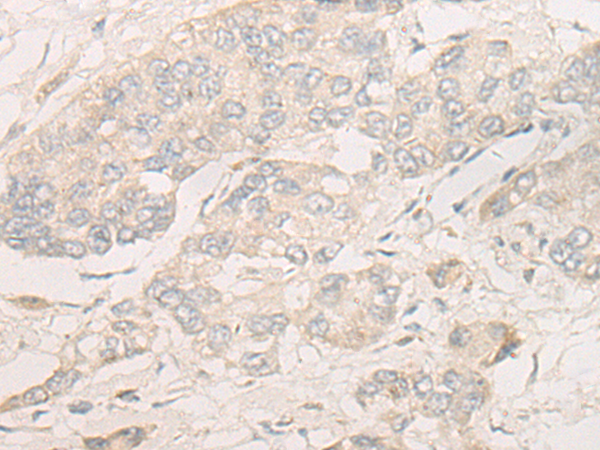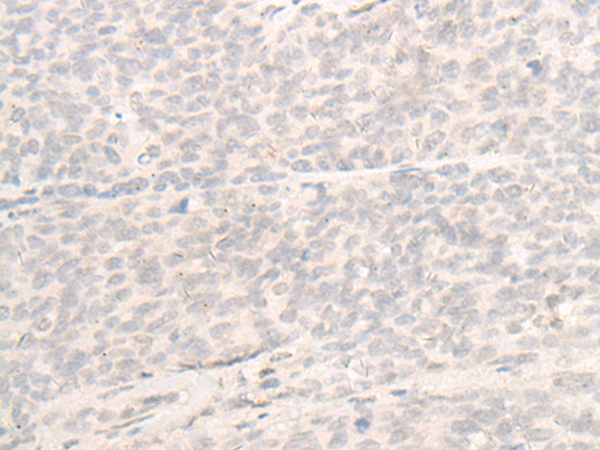

| WB | 咨询技术 | Human,Mouse,Rat |
| IF | 咨询技术 | Human,Mouse,Rat |
| IHC | 1/20-1/100 | Human,Mouse,Rat |
| ICC | 技术咨询 | Human,Mouse,Rat |
| FCM | 咨询技术 | Human,Mouse,Rat |
| Elisa | 1/5000-1/10000 | Human,Mouse,Rat |
| Aliases | DP9; DPLP9; DPRP2; DPRP-2 |
| Host/Isotype | Rabbit IgG |
| Antibody Type | Primary antibody |
| Storage | Store at 4°C short term. Aliquot and store at -20°C long term. Avoid freeze/thaw cycles. |
| Species Reactivity | Human |
| Immunogen | Synthetic peptide of human DPP9 |
| Formulation | Purified antibody in PBS with 0.05% sodium azide and 50% glycerol. |
+ +
以下是3-4条关于DPP9抗体的参考文献及其摘要概括:
---
1. **文献名称**: *"Structural and functional analysis of human DPP9 reveals a regulatory role in antigen processing"*
**作者**: Matteo Bonazzi et al.
**摘要**: 本研究利用X射线晶体学解析了DPP9的酶活性位点结构,并通过特异性抗体验证其在免疫细胞中的表达。研究发现DPP9通过调控抗原呈递途径中的肽段剪切,影响T细胞免疫反应,为自身免疫疾病提供了潜在治疗靶点。
2. **文献名称**: *"DPP9 modulates the NLRP3 inflammasome in macrophages through interaction with ASC"*
**作者**: Alana M. Thoms et al.
**摘要**: 文章揭示了DPP9通过结合凋亡相关斑点样蛋白(ASC)抑制NLRP3炎症小体激活。实验中通过DPP9抗体进行免疫共沉淀(Co-IP)和Western blot分析,证实其在巨噬细胞中的调控作用,为炎症性疾病机制提供了新见解。
3. **文献名称**: *"Dipeptidyl peptidase 9 expression in human tumors: A tissue microarray study"*
**作者**: M.A. Hähnel et al.
**摘要**: 该研究利用组织芯片和DPP9特异性抗体进行免疫组化分析,发现DPP9在肺癌、结直肠癌中高表达,且与患者生存率负相关。结果提示DPP9可能作为癌症预后标志物或治疗靶点。
4. **文献名称**: *"Development of a selective DPP9 inhibitor and its effects on cellular apoptosis"*
**作者**: J.E. Campbell et al.
**摘要**: 研究报道了一种高选择性DPP9小分子抑制剂,并通过抗体检测发现抑制DPP9活性可诱导癌细胞凋亡,同时不影响同源酶DPP8/DPP4.该发现为靶向DPP9的抗癌药物开发奠定了基础。
---
以上文献涵盖了DPP9的结构功能、免疫调控、癌症关联及药物开发方向,均涉及抗体的实验应用(如Western blot、免疫组化等)。如需具体期刊或年份信息,可进一步补充筛选。
The dipeptidyl peptidase 9 (DPP9) antibody is a critical tool for studying the role of DPP9. a member of the serine protease family that hydrolyzes post-proline dipeptides from substrates. DPP9 shares structural and functional similarities with DPP4 and DPP8 but is distinguished by its intracellular localization and broader tissue expression, including immune cells, the liver, and kidneys. It regulates biological processes such as apoptosis, immune response, and cell signaling, with emerging roles in cancer, inflammation, and metabolic disorders. Dysregulation of DPP9 has been linked to diseases like hepatocellular carcinoma, chronic inflammatory conditions, and viral infections.
DPP9 antibodies are widely used in research to detect protein expression, localization, and interactions via techniques like Western blotting, immunohistochemistry, and flow cytometry. Monoclonal antibodies (raised in mice or rabbits) offer high specificity, while polyclonal antibodies may detect multiple epitopes. Validating antibody specificity is crucial due to potential cross-reactivity with DPP8 or DPP4. Knockout cell lines or siRNA-mediated DPP9 silencing are common validation strategies.
Recent studies highlight DPP9's role in inflammasome regulation and its potential as a therapeutic target. However, challenges remain in understanding its substrate repertoire and disease-specific mechanisms. High-quality DPP9 antibodies are essential for advancing these investigations, bridging gaps between molecular biology and clinical applications.
×